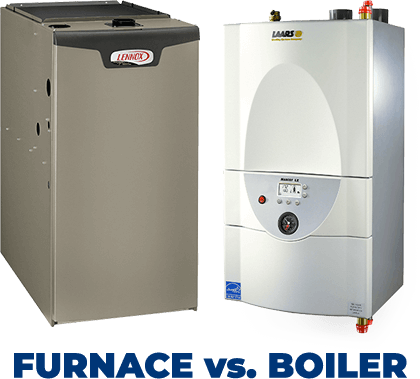Help! Do I Own a Furnace or Boiler?
Do You Have A Furnace or a Boiler?
 Many homes have either a furnace or a boiler to keep the house warm when the weather is frightful outside. Which system do you have in your home? Below are a few details to help you tell the difference between a boiler and a furnace.
Many homes have either a furnace or a boiler to keep the house warm when the weather is frightful outside. Which system do you have in your home? Below are a few details to help you tell the difference between a boiler and a furnace.
Know The Difference
Notably, a furnace creates heat that is conveyed to your home as warm air distributed by means of a large fan, through a string of ducts throughout the home. Heating systems that use a furnace are also known as forced air heating systems and feature warm air grilles often located in the floor, as well as return-air grilles typically attached to walls. In addition to routine annual inspection and maintenance, regular replacing of the furnace filter is critical to reliable, efficient, safe, long-term system performance. We’ve said this before and will continue to repeat it: No two systems are alike, there’s no accurate rule of thumb. In most cases, the filter needs to be replaced much more often than just one time per year. ‘Nuff said, for now!
A boiler, on the other hand, creates warmth by heating fluids such as water or glycol, which is then pumped around the home delivering heat through fixtures such as baseboard heaters, in-floor tubing, radiators, fan convectors – or even fancy towel warmers! Heating systems that use hot water boilers are also called hydronic heating systems. Their maintenance needs, while quite different from forced air furnaces, are also crucial to proper system performance, safety, and long-term reliability.
What are the Benefits of Boilers and Furnaces?
The Benefits of Boilers
One of the major benefits of boiler systems is that they allow the homeowner to easily create different heating zones around the home, so you don’t have to fully heat the entire structure in order to stay toasty in, say, just the living room or den. A great feature for keeping your heating costs under tight control as you migrate around your home during the winter. Of course, don’t leave the temp set too low in those unoccupied areas, especially as temperatures plummet.
Another advantage of hydronic heating systems is that there is much less sensation of warm air circulating around the home, less breezy or potentially dusty, such as many furnace systems demonstrate. As a result, some homeowners find boiler systems less intrusive – and boiler pumps are normally quieter than furnace fans. In addition, baseboard and radiant floor heating can potentially provide more even heating around the home, and closer to the floor where your feet need the heat!
Pros of Furnaces
Some of the advantages of furnaces, or forced air heating systems, are also worthy of note. Typically, in an ‘apples to apples’ comparison (although that’s not the whole story), it’s less costly to replace a furnace than it is to replace a boiler. Higher efficiency for the buck! Good to know if you’re looking for a new home. (And please don’t kid yourself that it will make cost-sense to convert from one system to another in an existing home; not likely, more luxury!)
An advantage of forced air heating that is often downplayed – and shouldn’t be quickly dismissed in our mostly arid climate – is the ability for furnaces to provide effective whole-home humidification and air filtration. Score one for Team Furnace. Done right, we can really help improve your indoor environment with central humidifiers, air cleaners, and air purifiers installed on your furnace system. When it comes to centrally cooling your home, score another for furnace systems for their ability to easily accommodate central air conditioning. (Ask us about ductless AC/heat pumps and you’ll get a whole ‘nother article!)
Lastly, forced air furnaces have gotten a bad rap, and often deservedly so, for being too loud, too windy, too hot-and-cold, too uneven, and more! Unfortunately, this has been true in many cases over many decades. But what many homeowners are just beginning to learn is that there are now options such as Two-Stage and Variable Output Furnaces, with different heating levels, varying fan speeds and more, which automatically adjust as conditions dictate. They’re quieter, provide more even heat, use less gas and electricity, and can help improve your indoor comfort by leaps and bounds with the right comfort accessories.
So there is no right or wrong, ‘better’ or ‘worse.’ Simply two different types of heaters, and some of the noteworthy things they can bring to the table.
What About Furnace & Boiler Efficiencies?
Efficiency levels of currently available furnaces range from about 80% AFUE to as high as 98% AFUE, AFUE being the accepted standard for comparing central heating equipment efficiencies. Boiler efficiencies are very comparable, although at the very top end furnaces ‘win out’ by a little. Both furnaces and boilers are available with automatically adjusting, variable heating output that’s ideal for our widely varying Colorado climate. In all cases when shopping for a new system, it’s important to take the time to learn about the features and advantages (and disadvantages) that each product offers so that you can make an informed decision.
Heating Services in Boulder and Denver, CO
If you are interested in a furnace or boiler installation or replacement, or maintenance and repair services, then Save Home Heat Company has you covered! Call us today to schedule an estimate for a new installation or to discuss your needs with a comfort consultant. Additionally, Save Home Heat Company offers a full range of cooling, plumbing and electrical home services to meet your needs in the Denver/Boulder metro area. Contact us today!
Tags: Boilers, Furnaces, Heating Systems



